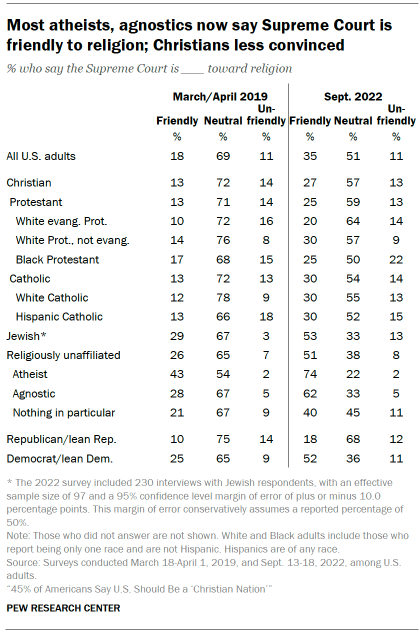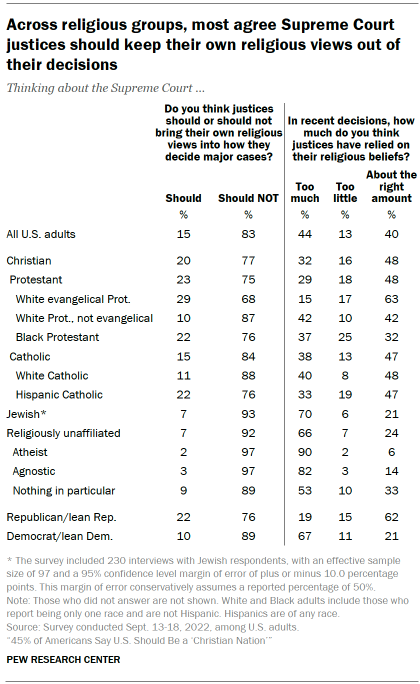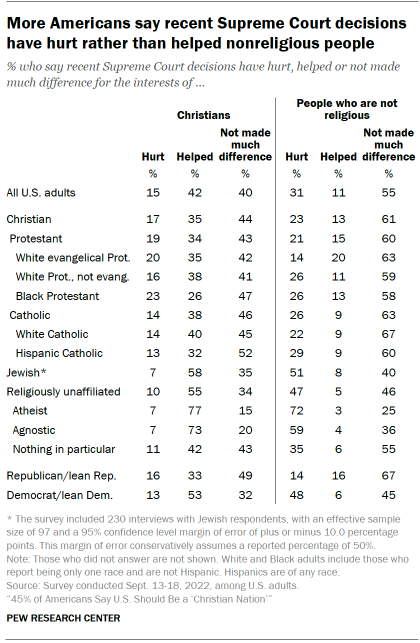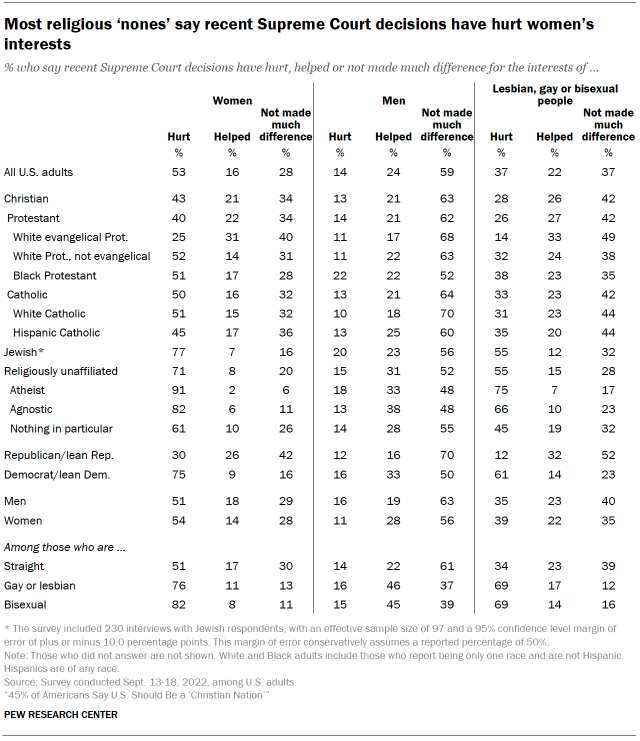On the heels of several major decisions with religious implications, including Dobbs v. Jackson Women’s Health Organization and Kennedy v. Bremerton School District, the new Pew Research Center survey finds a significant jump in the share of U.S. adults who say the Supreme Court is “friendly” to religion. Americans are more likely to say the court’s recent decisions have helped (rather than harmed) the interests of U.S. Christians, and harmed (rather than helped) the interests of people in the U.S. who are not religious.
A large majority of Americans say Supreme Court justices should not rely on their own religious beliefs when making judicial decisions, and many (44%) say the high court’s members have been doing so too much lately. But a similar share (40%) say they have been doing this about the right amount.
The remainder of this chapter explores these and other findings regarding religion and the Supreme Court in additional detail.
Share saying Supreme Court is ‘friendly’ to religion nearly doubles between 2019 and 2022

The Center survey finds a big increase in the share of Americans who view the Supreme Court as “friendly” toward religion. Following a historic session in which the court overturned Roe v. Wade and upheld the right of a public school football coach to offer prayers after games, more than one-in-three U.S. adults (35%) now say they think the Supreme Court is friendly toward religion, up from 18% who said this in 2019. Roughly half of adults (51%) say the high court is “neutral” toward religion (down from 69% in 2019), and about one-in-ten (11%) say it is “unfriendly” to religion (unchanged since 2019).
While the view that the high court is friendly toward religion has become more common across the religious and political spectrums, the new survey continues to find that non-Christians and Democrats are more inclined than Christians and Republicans to see the Supreme Court as friendly to religion. Most atheists (74%) and agnostics (62%) now describe the Supreme Court as friendly to religion, as do half of Jewish adults (53%) and half of Democrats (52%). Most Christians, meanwhile, say they think the court is neutral toward religion (57%), as do most Republicans (68%).
Eight-in-ten oppose idea of Supreme Court justices bringing their own faith into official decisions

Most Americans oppose the idea of Supreme Court justices bringing their own religious beliefs to bear in deciding major cases. More than eight-in-ten U.S. adults, including majorities in both political parties and in every religious group measured in the survey, say Supreme Court justices should not do this.
The survey also finds that Jews and religiously unaffiliated Americans are concerned Supreme Court justices have been going too far in this regard. Seven-in-ten Jews and two-thirds of religious “nones” (including 90% of atheists and 82% of agnostics) say the high court justices have relied too much on their own religious beliefs in their recent decisions.
Among Christians overall, the most common view is that the justices recently have been relying on their own religious beliefs about the right amount, though substantial minorities in several Christian groups (including 42% of White non-evangelical Protestants, 38% of Catholics and 37% of Black Protestants) agree with most Jews and religious “nones” in saying Supreme Court justices have been relying too much on their religious beliefs in making judicial decisions.
More say Supreme Court’s recent decisions have helped than hurt Christians

By a 42% to 15% margin, far more Americans say recent Supreme Court decisions have helped rather than hurt the interests of Christians, while four-in-ten say recent decisions have not made much difference for the interests of Christians. Non-Christians are far more inclined than Christians to say recent court decisions have aided Christian interests, with 58% of Jewish Americans and 55% of religious “nones” (including roughly three-quarters of atheists and agnostics) expressing this view. The survey also shows that Democrats are more inclined than Republicans to believe recent Supreme Court decisions have been helpful to Christians.
By contrast, roughly three times as many people say recent high court decisions have hurt the interests of people who are not religious (31%) than say recent decisions have helped nonreligious people (11%), with 55% saying recent judicial pronouncements have had little impact on this group. The view that the interests of nonreligious people have been harmed by recent Supreme Court decisions is more common among religious “nones” and Jews than among Christians, and more common among Democrats than Republicans.
The survey also finds that 53% of U.S. adults believe recent Supreme Court decisions have hurt the interests of women. Here again, this view is far more common among Jews and religious “nones” than among Christians, and far more common among Democrats than among Republicans.
More than a third of Americans believe recent judicial decisions have harmed the interests of lesbian, gay and bisexual people. Concern on this front is especially high among lesbian, gay and bisexual people themselves, among whom roughly seven-in-ten say the high court’s recent decisions have harmed the interests of people like them.
Most people say recent Supreme Court decisions have had little effect one way or the other on the interests of men.



